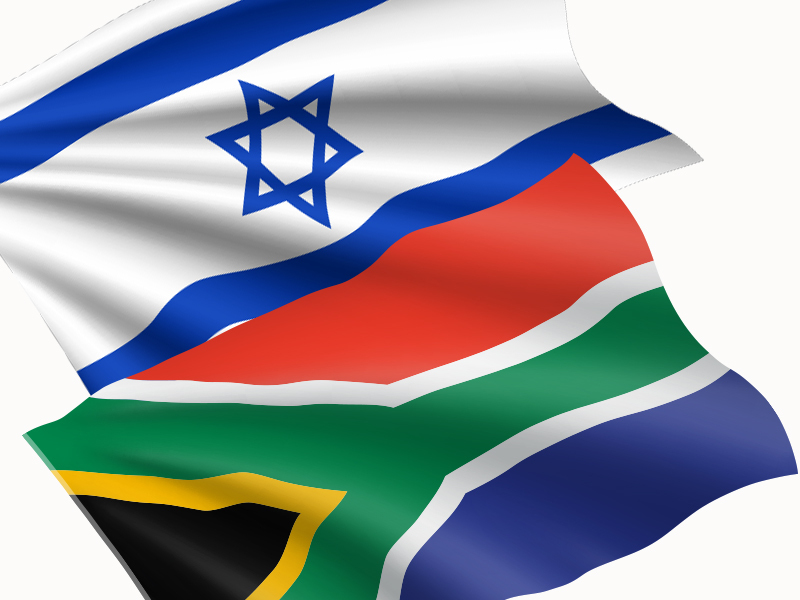SA would gain from de-hyphenating Israel-Palestine
The country has been in thrall to Palestinian ‘rejectionism’, at the cost of the benefits of stronger relations with Israel and the Palestinians
by Rowan Polovin, National Chairman, South African Zionist Federation
The desert sands of the Middle East and Africa are shifting quickly. The widely held view that peace between Israel and the Arab and Muslim nations depends upon peace between Israel and the Palestinians has been shown to be a mirage.
The Arab world, and much of Africa, has become impatient with decades of Palestinian rejectionism and multiple missed opportunities for peace and statehood, alongside a realisation that positive, pragmatic and direct ties with Israel are more beneficial, morally, politically and economically, than wasted decades of hostility.
That is why in 2018 the Sultanate of Oman invited Israeli Prime Minister Benjamin Netanyahu on an official state visit, the first between the two states since 1996. In the same year, Saudi Arabia allowed the first commercial airlines to fly over its airspace en route to and from Israel, something inconceivable only a few years before. Last October, the United Arab Emirates (UAE) openly invited Israel to participate in the World Expo that was to take place in Dubai (sadly postponed to 2021 due to Covid-19).
In January this year, Israel re-established diplomatic ties with the Muslim-majority African nation of Chad, which had cut ties back in 1972. In the past month, Qatar co-operated with Israel to broker a ceasefire agreement with Hamas in the Gaza strip.
We are now seeing improved ties between Israel and other Arab and Muslim-majority nations proceeding at a rapid pace, which may eventually result in direct and mutually beneficial ties between the Jewish state, all 21 Arab states, and most African countries. This shift is good for Israel and the Palestinians and provides the most likely chance of peace.
On August 13, Israel and the UAE signed a normalisation agreement, otherwise known as the Abraham Accord, bringing the undercurrents of change over the past few years to the surface and starting a groundswell of positive developments for the Middle East and Africa. Besides the Palestinian leadership, entrenched in the past and fixated in enmity against Israel, SA was one of the few countries not to give unqualified support to an accord that was an objective benefit to the region and ultimately to the Palestinians.
This position unfortunately places SA at odds with much of the world, including our Brics partners, which all expressed unequivocal support for the deal. It now appears that this failure to adapt to the winds of change may distance SA from much of the Arab and Muslim world as well.
Last week, the Arab League, a body that has historically unified Arab states around an uncompromisingly anti-Israel position, refused to pass a Palestinian-sponsored resolution condemning the Israel-UAE accord. Then on Friday the Kingdom of Bahrain announced that it had agreed to establish full diplomatic relations with Israel.
At the same time, Malawi, a country geographically and diplomatically close to SA, announced its intention to establish an embassy in Jerusalem, thereby recognising Jerusalem as Israel’s rightful capital. This contrasts with SA, which now has only a chargé d’affaires as its highest-ranking officer in Israel — not an ambassador — at our embassy in Tel Aviv — not in Jerusalem.
SA resists the winds of change, with no benefit to our country and its people. Pretoria needs to reshape its position to avoid missing out on the multiple opportunities brought by Israel’s successful peacemaking with her Arab and African neighbours. The SA government’s position has been to support the Palestinian leadership unconditionally, and to give their dispute with Israel disproportionately more airtime than all other international issues and conflicts.
SA is quick to release condemnatory statements and make speeches in international forums against Israel, thinking this keeps us in good company, but increasingly this places Pretoria at odds with its allies and partners. Embedded in SA politics is the notion that solidarity with the Palestinian people means antagonism towards Israel. This is a false dichotomy.
SA ought to free itself from this incorrect paradigm and move towards the “de-hyphenation” of Israel-Palestine, which means it is possible to have good relations with Israel as well as the Palestinians, that they are not mutually exclusive. In fact, positive relations with Israel gives SA more, not less, influence over the Palestinian issue, and strategically gives SA a constructive role to play as an international mediator and negotiator on an Israeli-Palestinian peace accord.
The objective gains from positive bilateral relations between SA and Israel include delivery of Israel’s world-leading solutions to solve our electricity and water crises, foreign direct investment in our struggling economy, collaboration in technology, agriculture, cybersecurity, artificial intelligence and other areas where Israel leads the world, as well as security co-operation and co-ordination on militant threats to the Southern African region.
Alongside this, SA can work with Israel and the Palestinians on trilateral projects to improve the Palestinian economy and infrastructure, education & training, including measures supporting co-existence and tolerance between religions and people. These achievements can all happen within the context of Africa and the Middle East opening up to Israel, and would reposition SA as an important African and international roleplayer on the issue.
All of this is possible without SA compromising its ties to the Palestinians, and will only improve SA’s stated objective of a two-state solution and peace between Israelis and Palestinians. The winds of change are sweeping through the Middle East and Africa. SA should participate, and benefit from the changing landscape.
The above op-ed first appeared in Business Day, 16 September 2020.
For the full article click here


